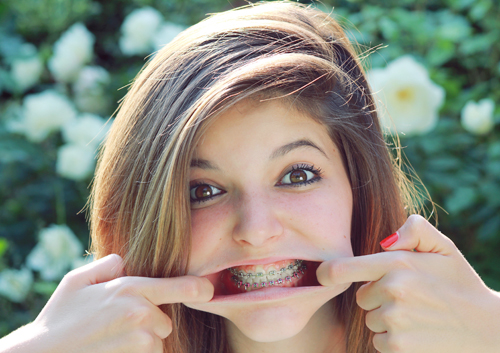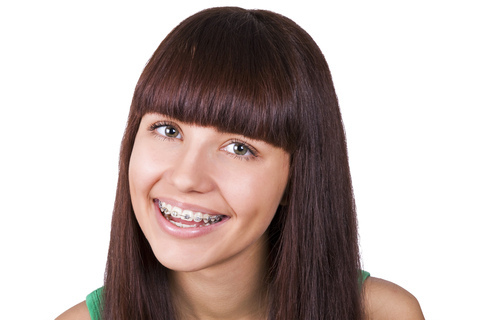Why is orthodontic treatment important?
September 27th, 2017

The goal of orthodontic treatment at Dr. Elena S. Iacob, which may include the use of braces, retainers, and aligners, is to straighten your teeth. Treatment often starts in the pre-teen or teenage years, but adults may also need orthodontic treatment. The treatment can feel like a chore that lasts for several months or a couple of years, but it can fix important problems. These include:
- Crowded teeth spaced too close together
- Gaps between your teeth
- Crooked teeth
- Overbite or underbite
- Upper and lower teeth that do not meet
Straight Teeth are More Attractive
You are more likely to be proud of your smile when your teeth are straight and evenly spaced. Pride in your appearance can give you more confidence and encourage you to try new things. This can be particularly important for adolescents. In addition, people often judge others based on first impressions. A smile that shows straight teeth is more attractive.
Better Oral Health is Easier
Brushing and flossing your teeth are two basic components of an oral health routine to protect your teeth from conditions such as tooth decay, gingivitis, and plaque build-up. As Dr. Elena Iacob and our staff know, caring for your mouth is easier when your teeth are straight. The American Dental Association says the following conditions are less likely to occur if you have the proper orthodontic treatment.
- Dental caries
- Gum disease or gingivitis
- Tooth loss
- Impaired speech
- Worn tooth enamel
Orthodontic Treatment Improves Nutrition
Poorly aligned teeth can reduce your ability to chew properly or make certain foods more difficult to eat. Many of these more challenging foods are healthy, and avoiding them can cause you to limit your diet to softer, often less-nutritious foods, such as ice cream and canned soup. Straighter teeth and a better ability to chew let you eat crunchy foods, such as apples and carrots; stringy foods, such as asparagus and chicken; and chewy foods, such as raisins.
Questions, questions…
September 20th, 2017

When beginning orthodontic treatment, most patients ask Dr. Elena Iacob and our team a lot of questions about what to expect, while others choose to just "go with the flow" and leave it to us to build for them a beautiful smile. And for our team at Dr. Elena S. Iacob, that's understandable.
But for those who do ask questions, two of the ones we frequently hear are "Will my braces hurt?" and "How long will these be on?"
We explain to our patients that despite what they've heard, braces do not hurt when they're initially put on. Yes, you will experience soreness after your braces are placed and when your teeth start to move. Too often, our patients hear horror stories about how much it hurts to get the braces on, so they tend to over-worry. The truth is, after their braces are on, almost all patients say "that's it?" because it's actually easy and painless!
At Dr. Elena S. Iacob, we answer most of your other questions during your initial exam. When a patient visits our office for the first time, we give him or her a time estimate of how long it will take to achieve their ideal smile. All other questions are answered at the bonding appointment when the braces are placed. We cover all the topics, everything from eating to brushing with braces, but we also know that after your initial appointment, it's natural for you to have questions about your or your child's treatment. And we are always here for you; we are thorough and always try to answer any questions or concerns you may have. As a patient, that's one thing you never have to worry about. You will always know what's going on throughout your orthodontic experience.
Ugh, Not Braces!
September 13th, 2017

Getting your child excited about braces is a lot like: A) convincing a grumpy toddler that it’s time to take a nap? B) convincing a teenager to stop texting during dinner? C) convincing your husband to eat his peas? The answer, obviously, is all of the above.
And that’s why you may need a few thoughtful ways to get your child on board with braces.
- Throw a pre-braces party. It can’t be just any party, however, but a Willy Wonka celebration of candy, chips, gum, and all the sticky and sweet foods your child won’t be able to indulge in during the time he or she is wearing braces. Promise a post-braces celebration, too, and watch as your child’s eyes widen at the thought of an all-you-can-eat junk food buffet.
- Encouraging phrases like “braces aren’t eternal, but your straight smile will be” can go a long way.
- If your daughter is worried about getting picked on because of braces, then name-drop some A-list celebrities who have worn them. The list includes Cameron Diaz, Kelly Clarkson, Dakota Fanning, and Gwen Stefani.
- Emphasize that braces today aren’t the same as they were in the Stone Age. From clear ceramic braces to different-colored braces, more options are available. Braces can be cool accessories to express a personal style.
- To get your child to embrace braces, you need to sing the praises of beautiful teeth, even if that means pointing out how crooked your teeth are because you never got braces.
Going Back to School with Braces
September 6th, 2017

Going back to school is already an exciting (and sometimes nerve-racking) time so we don't want your braces adding to that. Our Frisco team has compiled some helpful tips to make the process as easy and fun as possible.
1. Make sure you pack or purchase braces-friendly lunches
Try to avoid overly crunchy foods (think carrots, celery, hard crackers) especially if your teeth are sore from having your braces tightened. But you shouldn't stop eating healthful foods that fall in this category. For instance apples can be sliced into wedges or carrots can be cut into coins.
You should also avoid sticky foods like candy or gum that can and will stick in your braces like glue! Softer foods are easier on your teeth and braces, so aim to make a good portion of your lunch on the softer side.
2. Have a braces kit in your backpack or locker
Having some useful items on hand at school when you need them is one of the most helpful things you can do. Pack some wax for sores or tenderness, floss and/or flossing tools made for braces, a toothbrush and toothpaste, a small cup for rinsing, a small mirror to check for trapped food, and some lip balm if your lips tend to chap. With these tools on hand, you'll avoid most if not all braces-related nuisances!
3. Know that you're not alone
If you're feeling self-conscious about your braces, don't. Be proud of them! There are many other people your age who have braces, and if they don't have them now, they probably will in the future. Relax and know that you're on the path to a straighter and healthier smile.
If you have any questions about making your transition into "braceshood," just ask Dr. Elena Iacob or any member of our Frisco team! We're here to help make your braces experience (and your smile) the best it can be.






